

Venture Boldly

Office of Communications
2 East South Street
Galesburg, IL 61401

Abraham Lincoln and Charles Darwin share more than a birthday, February 12, 1809. Knox College -- as an institution committed to education and equality, and as a place in history -- highlights their connections, and is linked to them in ways that 200 years later are still relevant.
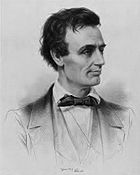 Lincoln, Darwin and Knox all shared opposition to slavery. It was during Lincoln's riverboat journey down the Mississippi to New Orleans in 1830-31 that the 21-year-old for the first time witnessed the horrors of a slave market. One record states that Lincoln "was stirred with a righteous indignation, and told his traveling companions: 'Boys, if ever I get a chance to hit that thing [slavery] I'll hit it hard!' "
Lincoln, Darwin and Knox all shared opposition to slavery. It was during Lincoln's riverboat journey down the Mississippi to New Orleans in 1830-31 that the 21-year-old for the first time witnessed the horrors of a slave market. One record states that Lincoln "was stirred with a righteous indignation, and told his traveling companions: 'Boys, if ever I get a chance to hit that thing [slavery] I'll hit it hard!' "
Likewise, it was on a voyage -- Darwin's trip around the world aboard the Beagle in the 1830s -- that the young scientist "was outraged by the suffering he saw inflicted by slavery." According to a review of the newly published book, "Darwin's Sacred Cause," Darwin "was driven by the great moral cause of his day: opposition to slavery... his family was passionately abolitionist and he continually mixed with people devoted to the cause."
All through the 1830s, Knox's founder, The Reverend George Washington Gale, was involved with abolitionist organizations. In 1837 Gale and other anti-slavery activists established both Knox College and the city of Galesburg.
Some two decades later, Knox would provide the venue for one of the 1858 Lincoln-Douglas Debates. During the Knox debate at Old Main, Lincoln denounced the morality of Stephen A. Douglas's position on slavery. In 1860, Knox awarded Lincoln an honorary doctorate.
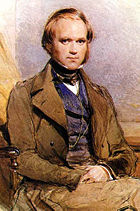 Early in the 20th Century, Knox welcomed to its faculty a distinguished scholar -- less well known than Lincoln or Darwin, but whose work would also stir a national controversy. George W. Hunter (1873-1948) attended Williams College and New York University. He taught biology in high school from 1899 until 1906, then at Carleton College until 1919. Hunter came to Knox in 1920 -- the first Jewish member of the Knox College faculty -- serving until 1926 as professor and chair of the biology department.
Early in the 20th Century, Knox welcomed to its faculty a distinguished scholar -- less well known than Lincoln or Darwin, but whose work would also stir a national controversy. George W. Hunter (1873-1948) attended Williams College and New York University. He taught biology in high school from 1899 until 1906, then at Carleton College until 1919. Hunter came to Knox in 1920 -- the first Jewish member of the Knox College faculty -- serving until 1926 as professor and chair of the biology department.
Hunter authored or co-authored thirty textbooks for college, high school, and junior high school biology courses. He was best known, however, for one book in particular, "Civic Biology." Published in 1914, the book contained a chapter on evolution and Charles Darwin, and became the basis for the infamous Scopes "Monkey" Trial. In 1925, a Tennessee high school teacher, John T. Scopes, had used Hunter's book to teach a class and was accused of violating a state law prohibiting the teaching of evolution. Two of the country's most prominent lawyers, Clarence Darrow for the defense, and William Jennings Bryan for the prosecution, were involved in bringing the Scopes case to trial.
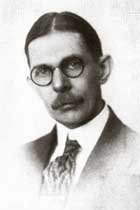 Unlike many of his contemporaries, Hunter (right) shunned the media circus of the Scopes Trial. Several months after the trial finished, Hunter said of the controversy: "There is no more reason for a scientist to say that he must choose between the idea of God and the evolutionary development of man than there is for a religious person to say 'God or natural selection' or 'The Bible or Darwinism.' There would be just as much sense in saying that it is necessary to choose between water to drink or air to breathe. There is no reason why a scientist cannot be religious."
Unlike many of his contemporaries, Hunter (right) shunned the media circus of the Scopes Trial. Several months after the trial finished, Hunter said of the controversy: "There is no more reason for a scientist to say that he must choose between the idea of God and the evolutionary development of man than there is for a religious person to say 'God or natural selection' or 'The Bible or Darwinism.' There would be just as much sense in saying that it is necessary to choose between water to drink or air to breathe. There is no reason why a scientist cannot be religious."
In his career at Knox, George Hunter had a profound impact on the College, and a deep concern for the Galesburg community. He established what is now one of the oldest student awards at the College, the Hunter Trophy, which honors both athletic and academic achievement; the very first Hunter Trophy was awarded in 1920 to Adolph P. "Ziggy" Hamblin (below left), an outstanding student and athlete at Knox and later a renowned faculty member and coach at West Virginia State University.
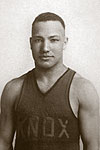 Hunter also took a strong interest in community health, and it was in one of his courses in the 1920s -- a class in public health -- that we find the first recorded example of independent research by Knox students. The research was a community-based study of Galesburg's notoriously inadequate municipal sanitation. An article about the project, written by two students in the class, was published by the Illinois Academy of Science. The students, who graduated from Knox in 1923, both went on to careers in the medical field. The Galesburg Sanitary District was created in 1924 and within the decade, Galesburg had embarked on a major municipal sewage control construction project.
Hunter also took a strong interest in community health, and it was in one of his courses in the 1920s -- a class in public health -- that we find the first recorded example of independent research by Knox students. The research was a community-based study of Galesburg's notoriously inadequate municipal sanitation. An article about the project, written by two students in the class, was published by the Illinois Academy of Science. The students, who graduated from Knox in 1923, both went on to careers in the medical field. The Galesburg Sanitary District was created in 1924 and within the decade, Galesburg had embarked on a major municipal sewage control construction project.
Professor Hunter spoke fondly of Knox: "The six years I spent in Galesburg were among the happiest of my life, and I may honestly say that of all my forty-odd years of teaching, these were the richest in inspiration and cooperation with the students I loved and taught."
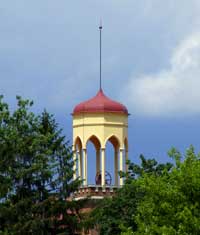
Published on February 06, 2009